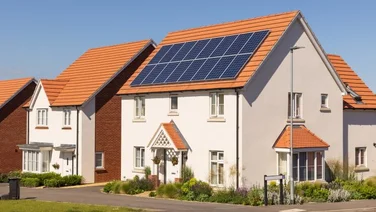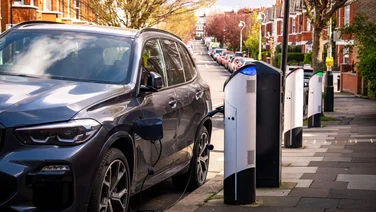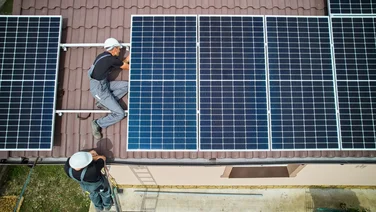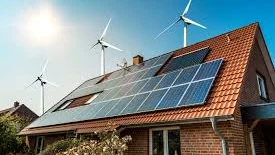Get Free Solar Panel Quotes
Find out how much solar panels would cost you
Do you need solar panels for your home or business? Fill in our form - Get a free quote - Start saving on energy bills
Why get solar panels?
- Generate free, green electricity
- Reduce your electricity bill by up to 64%
- Get paid for what you don't use
As featured in: 


News
The latest news, analysis, guides and opinion.

Energy industry split on ‘zonal pricing’ proposal
The government is reportedly considering zonal pricing for energy bills, but the industry is split on the idea.
-
 Solar panels to be installed on all newbuild homes in England Housebuilders will be legally required to install solar panels on all new-build properties by 2027, according to new plans by the government, in a move that could cut bills and generate huge amounts of clean energy.
Solar panels to be installed on all newbuild homes in England Housebuilders will be legally required to install solar panels on all new-build properties by 2027, according to new plans by the government, in a move that could cut bills and generate huge amounts of clean energy. -
 Government plans to expand Boiler Upgrade Scheme after record applications The government said it has launched a new consultation to expand the Boiler Upgrade Scheme, after it experienced its highest month of applications in March 2025, at 4,028 - a 88% increase year on year.
Government plans to expand Boiler Upgrade Scheme after record applications The government said it has launched a new consultation to expand the Boiler Upgrade Scheme, after it experienced its highest month of applications in March 2025, at 4,028 - a 88% increase year on year. -
 Buying an EV could save motorists more than £800 a year, ECIU says Britons could be missing out on more than £800 a year if they choose to purchase a hybrid car over a fully-electric car, amid industry concerns around the government’s latest update to the Zero Emission Vehicle Mandate (ZEV), new analysis from the Energy and Climate Intelligence Unit (ECIU) has found.
Buying an EV could save motorists more than £800 a year, ECIU says Britons could be missing out on more than £800 a year if they choose to purchase a hybrid car over a fully-electric car, amid industry concerns around the government’s latest update to the Zero Emission Vehicle Mandate (ZEV), new analysis from the Energy and Climate Intelligence Unit (ECIU) has found. -
 UK starts 2025 with solar panel installation boom The UK saw a record month for solar panel installations in March 2025, with more than 21,000 taking place, the highest since December 2015, according to the latest data from the MCS Data Dashboard.
UK starts 2025 with solar panel installation boom The UK saw a record month for solar panel installations in March 2025, with more than 21,000 taking place, the highest since December 2015, according to the latest data from the MCS Data Dashboard. -
 Trump’s tariffs could help cut energy bills, analysts predict New forecasts from Cornwall Insight have predicted energy prices will fall by almost 9% when Ofgem announces its July Energy Price Cap thanks in part to Donald Trump’s tariffs causing the wholesale price of gas to fall, meaning the average customer would pay £166 less per year.
Trump’s tariffs could help cut energy bills, analysts predict New forecasts from Cornwall Insight have predicted energy prices will fall by almost 9% when Ofgem announces its July Energy Price Cap thanks in part to Donald Trump’s tariffs causing the wholesale price of gas to fall, meaning the average customer would pay £166 less per year. -
 Navien unveils new easy-to-integrate, remote operating air source heat pumps Navien, a heating solutions provider based in South Korea, has released a range of new air source heat pumps that are designed to easily integrate with existing residential heating systems and operate remotely.
Navien unveils new easy-to-integrate, remote operating air source heat pumps Navien, a heating solutions provider based in South Korea, has released a range of new air source heat pumps that are designed to easily integrate with existing residential heating systems and operate remotely. -
 BBC forces Evan Davis to stop presenting Happy Heat Pump Podcast PM presenter forced to step away from passion project over fears subject matter was 'treading on areas of public controversy'
BBC forces Evan Davis to stop presenting Happy Heat Pump Podcast PM presenter forced to step away from passion project over fears subject matter was 'treading on areas of public controversy' -
 Energy companies call on government to update its Warm Homes Plan The Energy Saving Trust and 11 other expert home and business decarbonisation organisations have written to Miatta Fahnbulleh MP, minister for energy consumers, to make sure the government’s Warm Homes Plan permanently brings down energy bills accelerating the roll out of low-carbon heating, among much else.
Energy companies call on government to update its Warm Homes Plan The Energy Saving Trust and 11 other expert home and business decarbonisation organisations have written to Miatta Fahnbulleh MP, minister for energy consumers, to make sure the government’s Warm Homes Plan permanently brings down energy bills accelerating the roll out of low-carbon heating, among much else. -
 CATL unveils new battery that can charge EVs in five minutes Contemporary Amperex Technology (CATL), the world’s largest producer of electric vehicle (EV) batteries, has unveiled a battery which offers 320 miles of travel with just five minutes of charging, rivaling industry giant BYD’s.
CATL unveils new battery that can charge EVs in five minutes Contemporary Amperex Technology (CATL), the world’s largest producer of electric vehicle (EV) batteries, has unveiled a battery which offers 320 miles of travel with just five minutes of charging, rivaling industry giant BYD’s.